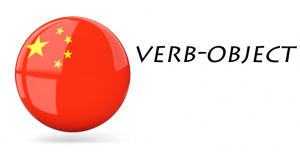Language/Mandarin-chinese/Grammar/Separable-verbs
Hello everybody!
Welcome to today's fascinating lesson on a unique aspect of Chinese grammar! We'll be diving into the world of "separable words" (離合詞/离合词, líhécí) or "separable verbs" (離合動詞/离合动词, líhédòngcí), which are known for their ability to "separate" into two distinct parts - primarily consisting of a verb and an object - with other words seamlessly fitting in between. These intriguing linguistic constructions are sometimes referred to as "verb-object phrases" due to their distinctive structure.
The categorization of separable verbs or verb-object phrases has sparked some debate among linguists, with some considering them as individual words, while others view them as phrases. Some even argue that they can be seen from both perspectives, depending on the context.
In this comprehensive lesson, we'll delve into the various nuances of separable verbs and help you gain a solid understanding of how to use them effectively. We'll explore their characteristics, provide examples for your reference, and offer tips to make your Chinese language journey smoother.
Remember, this is a collaborative learning experience, and we encourage you to contribute by editing this wiki page if you believe it can be improved or have additional insights to share. So let's embark on this exciting linguistic adventure and master the art of using separable verbs in Chinese!
Rules[edit | edit source]
If the verb 說/说 (shuō) "to speak" is followed by a complement, it is used alone:
- 我說漢語。/我说汉语。 (Wǒ shuō hànyǔ.)
I speak Chinese.
But if we simply mean “I speak”, we must add a “standard complement”: 話/话 (huà).
To say “He speaks”, we have to use 他說話。/他说话。 (Tā shuō huà.) and not simply 他說。/他说。 (Tā shuō.).
We also have already seen “write” 寫/写 (xiě) which requires the standard complement 字 (zì):
- 她寫字。/她写字。 (Tā xiě zì.)
She writes.
Attention, it is absolutely necessary to remove the standard complement when another complement is specified.
The following sentence is therefore false: 他說話漢語/他说话汉语。 (Tā shuō huà hànyǔ.)
A verb-object may be heard alone, but in this case the complement is implied:
- (漢語)我會說,不會寫。/(汉语)我会说,不会写。 [(Hànyǔ) wǒ huì shuō, bú huì xiě]
(Chinese) I can speak it, but not write it.
Special words between separable words[edit | edit source]
The following special words can be inserted between separable words:
- 了 (le);
- 著/着 (zhe);
- 過/过 (guò);
- 不 (bù);
- 得 (de);
- result complement (e.g. 好, 起);
- classifier (e.g. 個/个, 節/节).
3 categories[edit | edit source]
Separable words can be classified into 3 categories:
- verb and object, e.g. 上課/上课 (shàng kè), 開車/开车 (kāi chē), only 了 (le), 著/着 (zhāo), 過/过 (guò), result complement, classifier, 了 + classifier, 著/着 + classifier (rare), 不 + result complement, 得 + result complement can be inserted, letting alone attributes of the object;
- verb and result complement, e.g. 看見/看见 (kàn jiàn), 撥動/拨动 (bō dòng), only 不, 得 can be inserted;
- verb and directional verb, e.g. 出來/出来 (chū lái), 分開/分开 (fēn kāi), only 不, 得, can be inserted.
Examples[edit | edit source]
- 我上了節課。/我上了节课。 (Wǒ shàng le jié kè.)
I went to class.
- 我上了節有趣的課。/我上了节有趣的课。 (Wǒ shàng le jié yǒuqùde kè.)
I went to an interesting class.
- 我睡不好覺。/我睡不好覺。 (Wǒ shuì bì hǎo jiào.)
I can't sleep well.
- 我開起車來。/我开起车来。 (Wǒ kāi qǐ chē lái.)
I started driving.
- 我看得見。/我看得见。 (Wǒ kàn de jiàn.)
I can see it.
- 我出不來。/我出不来。 (Wǒ chū bù lái.)
I can't get out.
Some Common Separable Words[edit | edit source]
*Note: In dictionaries, separable words are noted with “//” between their pinyin.
| Chinese | Pinyin (dictionary form) * | Translation |
|---|---|---|
| 上課/上课 | shàng//kè | to have a class |
| 住院 | zhù//yuàn | to be hospitalised |
| 發燒/发烧 | fā//shāo | to get a fever |
| 吃飯/吃饭 | chī//fàn | to eat |
| 開學/开学 | kāi//xué | to start a new term of school |
| 開車/开车 | kāi//chē | to drive |
| 打的 | dǎ//dī | to get a taxi |
| 游泳 | yóu//yǒng | to swim |
| 看病 | kàn//bìng | to see a doctor |
| 睡覺/睡觉 | shuì//jiào | to sleep |
| 聊天 | liáo//tiān | to chat |
| 說話/说话 | shuō//huà | to speak |
| 起床 | qǐ//chuáng | to get up |
Sources[edit | edit source]
- https://resources.allsetlearning.com/chinese/grammar/Separable_verb
- https://mandarinfriend.wordpress.com/2015/02/12/separable-verbs-a-misleading-concept-for-chinese-learners/
Other Lessons[edit | edit source]
- Be Polite
- How to ask a question in Chinese
- Questions with 不 (bù)
- Mastering Chinese Grammar Easily – 8 Rules You Need to Know
- 是...的
- Ask for directions in Chinese
- 不 (bù)
- Express possession with 有 (yǒu)
- Basic structure of a sentence
- 也 yě

